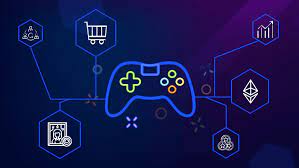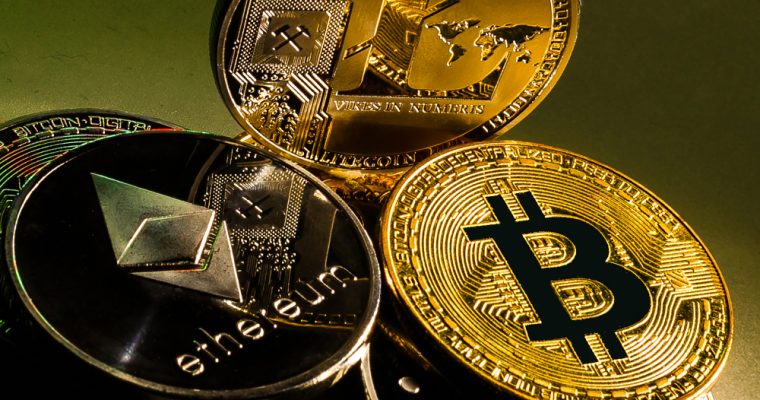In-depth exploration of Forbes blockchain 50 product data: Which two fields are most concerned about?
Author: Blockdata Research
Editor's note: The original title was "In-depth exploration of Forbes blockchain 50 product data"
It can be clearly seen from the products being built and put into use that the world's largest companies are using blockchain technology to solve practical problems. This article starts from the two areas that attract the most attention in the Forbes Block 50, and analyzes which companies are researching and developing these areas, and what stage of development is currently in.
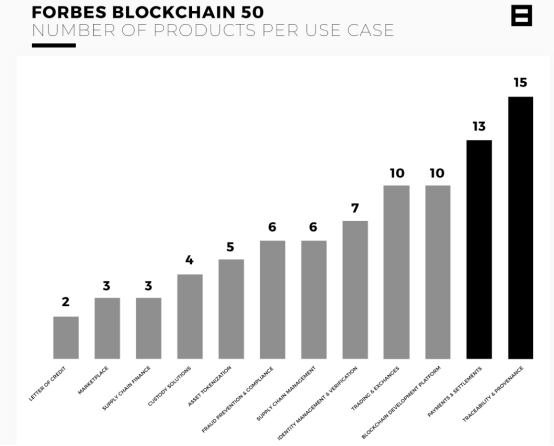
- TOP 30 series observations: Q1 average holding income range is 148%, halving the market shows power
- After bitcoin cash halved, the hash rate dropped and prices moved smoothly
- How to choose cryptography technology? Final exploration of the security model of quantum computing communication
Traceability And traceability ( Provenance)
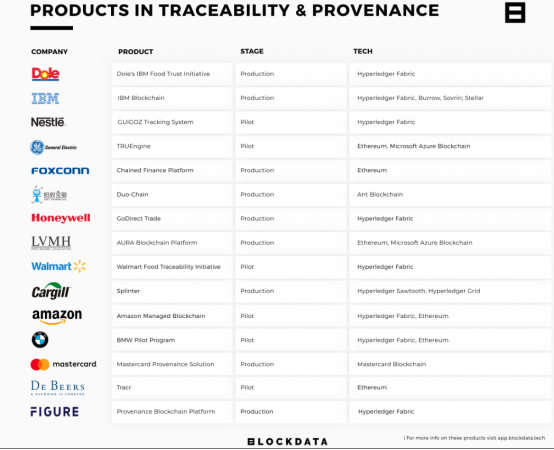
Our data shows that in the Forbes 50 list, 15 companies are researching and solving products related to traceability and provenance. This use case is spread across multiple industries, including agriculture, mining, aerospace, food and automotive. Cargill is the largest private company in the United States and is developing an open source platform called Splinter based on revenue. The platform can realize "communication and transactions between organizations under the premise of maintaining the privacy of all parties" in its supply chain (using various Hyperledger products, including Sawtooth, Grid, Transact, etc.). Similarly, Foxconn, a contract manufacturer that manufactures consumer electronics products such as iPhones and Playstations, is also using blockchain technology to simplify financing for its suppliers through blockchain finance, many of which are small and medium enterprises.
As a supporter of the Hyperledger blockchain project and its many platforms, IBM has appeared in people's eyes because of the "Food Trust" program. The plan allows companies to quickly and accurately determine the origin of individual commodities in their supply chain. Notable participants in this sentence include Wal-Mart, Nestlé and Dole Foods.
Payments and settlements
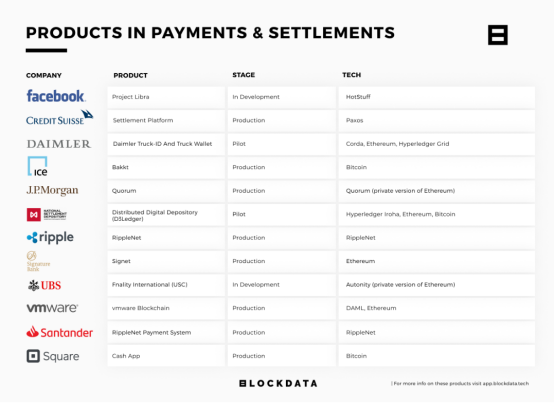
The second place is the development in the field of payment and settlement. Of course, the companies in this list are mainly in the financial services field. The banking giant JPMorgan Chase ’s Quorum Blockchain was originally built on the Ethereum platform, but added features such as permission access to make it more attractive to business users. Ripple is a relatively new company entering the financial services field, known for its XRP Ledger and accompanying XRP digital currency. RippleNet claims to be "the most convenient global payment network in the world". It cooperates with many big-name financial institutions, including Santander, MoneyGram (Ripple is one of the company's shareholders) and Japanese bank MUFG. Square, currently operated by Twitter CEO and Bitcoin supporter Jack Dorsey, currently credits half of its popular Cash App revenue to BTC, with a total of 5.16 revenue from BTC during 2019 One hundred million U.S. dollars.
In addition to traditional financial services, there is the automaker Daimler on the above list. Their Truck-ID and Truck Wallet products are designed to allow vehicles to automatically trade with other machines. For example, they successfully tested the automatic payment function of the electric charging station of the next generation of heavy-duty vehicles.
Of course, if Facebook's Project Libra is not mentioned, what would be the list of large companies in the blockchain payment space? Although its governing body, the Libra Association, has lost several of its more well-known members, the project has had a huge impact on getting central banks and regulators to focus on digital currencies. Time will tell whether Libra will be released in the form of currency, and in what form, but most of the activities around the Central Bank Digital Currency (CBDC) are after Facebook announced that it is developing digital currency last year. Not accidentally.
in conclusion
It can be clearly seen from the products being built and put into use that the world's largest companies are using blockchain technology to solve practical problems. Fields such as digital identity and asset tokenization, although not very popular on this list, but as companies design methods to digitize physical assets, these fields will also be available in the coming years. Large-scale development. Do n’t be surprised if your car starts to arrange for its own maintenance (and pay from your wallet), or can invest part of the ownership of a real estate project as easily as trading stocks. The ongoing work to bring blockchain technology to the wider world will be the tip of the iceberg of our application of innovation in the future of science and technology.
We will continue to update Blocking; if you have any questions or suggestions, please contact us!
Was this article helpful?
93 out of 132 found this helpful
Related articles
- The money circle of the currency circle is eyeing a short video: dozens of "fire bull" platforms have been born, claiming to be "500 per month lying"
- Ali & JD.com ’s blockchain war, Jack Ma: 100 billion is not enough, I will invest 200 billion
- U.S. Congressional Oversight Agency Says Very Interested in Blockchain Technology
- Babbitt column | stocks inward, tokens outward
- Viewpoint | Blockchain can improve data governance transparency and efficiency, privacy protection still faces challenges
- What is the impact of halving BCH, BSV, and BTC?
- There is no skyrocketing currency price, no miner death spiral, is BCH halved?

